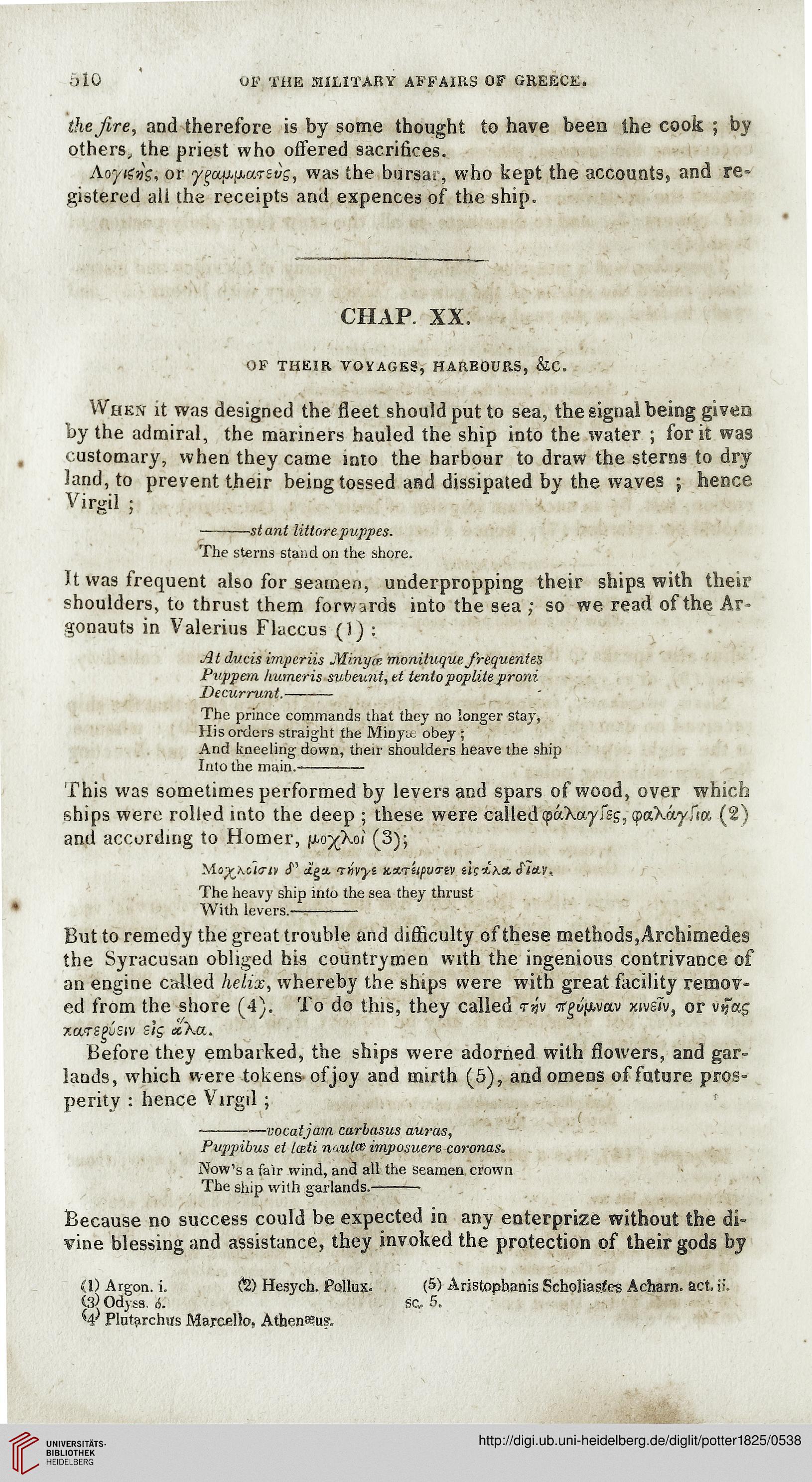510
up the military affairs of greece.
the fire, and therefore is by some thought to have been the cook ; by
others, the priest who offered sacrifices.
Aoyifcfe or yfoja^aTEt/ff, was the bursa:, who kept the accounts, and re-
gistered ail the receipts and expences of the ship.
CHAP. XX.
of their voyages, harbours, &,c.
When it was designed the fleet should put to sea, the signal being given
by the admiral, the mariners hauled the ship into the water ; for it was
customary, when they came into the harbour to draw the sterns to dry
land, to prevent their being tossed af?d dissipated by the waves ; hence
Virgil 5
-stant littore puppes.
The sterns stand on the shore.
It was frequent also for seamen, underpropping their ships with their
shoulders, to thrust them forw ards into the sea ; so we read of the Ar-
gonauts in Valerius Flaccus (1) :
Jit ducis imperiis Minyce monituque frequentes
Pvppem humeris subeu?it, tt lentopoplite proni
Decurrunt.- ' ;
The prince commands that they no longer stay,
His orders straight the MSbyti: obey ;
And kneeling down, their shoulders heave the ship
Into the main.--
This was sometimes performed by levers and spars of wood, over which
ships were rolled into the deep ; these were calledtpaXotyfeg, tpaXayfia (2)
and according to Homer, ^o-/\oi (3);
The heavy ship into the sea they thrust
With levers.—■-
But to remedy the great trouble and difficulty of these methods,Archimedes
the Syracusan obliged his countrymen with the ingenious contrivance of
an engine called helix, whereby the ships were with great facility remov-
ed from the shore (4). To do this, they called <r??v irgv^wv xivslv, or vfas
xarsgusn stg ccXa.
Before they embarked, the ships were adorned with flowers, and gar-
lands, which were tokens-of joy and mirth (5), and omens of future pros-
perity : hence Virgil ;
--vocatjam carbasus auras,
Puppibus et leeti nauice imposuere coronas.
Now's a fair wind, and all the seamen crown
The ship with garlands.-
Because no success could be expected in any enterprize without the di-
vine blessing and assistance, they invoked the protection of their gods by
(1) Argon, i. (2) Hesych. Pollux.
(3) Odyss. 6.
W Plutarchus Marcelb, Athenwuf.
(5) Aristophanis Scholiasts Acham. act. ii.
sc, 5.
up the military affairs of greece.
the fire, and therefore is by some thought to have been the cook ; by
others, the priest who offered sacrifices.
Aoyifcfe or yfoja^aTEt/ff, was the bursa:, who kept the accounts, and re-
gistered ail the receipts and expences of the ship.
CHAP. XX.
of their voyages, harbours, &,c.
When it was designed the fleet should put to sea, the signal being given
by the admiral, the mariners hauled the ship into the water ; for it was
customary, when they came into the harbour to draw the sterns to dry
land, to prevent their being tossed af?d dissipated by the waves ; hence
Virgil 5
-stant littore puppes.
The sterns stand on the shore.
It was frequent also for seamen, underpropping their ships with their
shoulders, to thrust them forw ards into the sea ; so we read of the Ar-
gonauts in Valerius Flaccus (1) :
Jit ducis imperiis Minyce monituque frequentes
Pvppem humeris subeu?it, tt lentopoplite proni
Decurrunt.- ' ;
The prince commands that they no longer stay,
His orders straight the MSbyti: obey ;
And kneeling down, their shoulders heave the ship
Into the main.--
This was sometimes performed by levers and spars of wood, over which
ships were rolled into the deep ; these were calledtpaXotyfeg, tpaXayfia (2)
and according to Homer, ^o-/\oi (3);
The heavy ship into the sea they thrust
With levers.—■-
But to remedy the great trouble and difficulty of these methods,Archimedes
the Syracusan obliged his countrymen with the ingenious contrivance of
an engine called helix, whereby the ships were with great facility remov-
ed from the shore (4). To do this, they called <r??v irgv^wv xivslv, or vfas
xarsgusn stg ccXa.
Before they embarked, the ships were adorned with flowers, and gar-
lands, which were tokens-of joy and mirth (5), and omens of future pros-
perity : hence Virgil ;
--vocatjam carbasus auras,
Puppibus et leeti nauice imposuere coronas.
Now's a fair wind, and all the seamen crown
The ship with garlands.-
Because no success could be expected in any enterprize without the di-
vine blessing and assistance, they invoked the protection of their gods by
(1) Argon, i. (2) Hesych. Pollux.
(3) Odyss. 6.
W Plutarchus Marcelb, Athenwuf.
(5) Aristophanis Scholiasts Acham. act. ii.
sc, 5.




